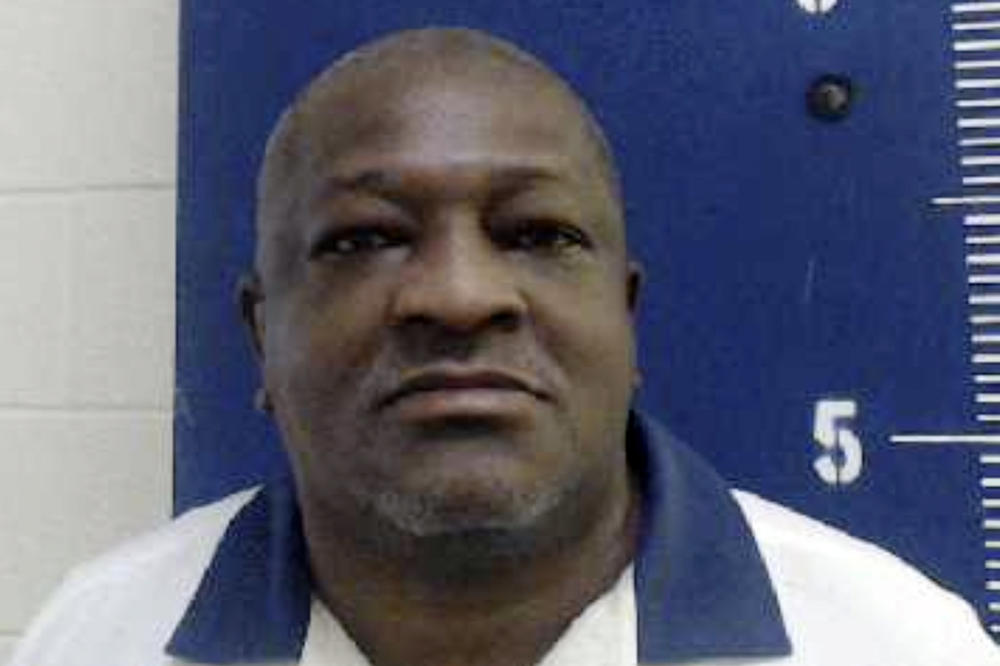
Section Branding
Header Content
Georgia Today: Mental health workforce bill; Man set for execution seeks clemency; Farmers' stress
Primary Content
On the Tuesday, March 19 edition of Georgia Today: A new bill may bring more mental health care professionals to the state; the man facing Georgia's first execution in four years is seeking last minute clemency; and Georgia farmers hold a summit to discuss stress.

Peter Biello: Welcome to the Georgia Today podcast from GPB News. Today is Tuesday, March 19. I'm Peter Biello. On today's episode, a new bill may bring more mental health care professionals to the state. The man facing Georgia's first execution in four years is seeking last-minute clemency. In Georgia, farmers hold a summit to discuss stress. These stories and more are coming up on this edition of Georgia Today.

Story 1:
Peter Biello: State lawmakers have passed a bill creating a program that aims to bring more mental health care professionals to Georgia. GPB's Sarah Kallis reports.
Sarah Kallis: Senate Bill 480 would create a student loan repayment program for some mental health care workers who work with underserved populations. To be eligible, they would enter an agreement with Georgia Board of Health Care Workforce. The board will determine how much debt it will pay for. Rep. Sharon Cooper says she hopes the bill will address Georgia's mental health care workforce shortage.
Sharon Cooper: One of the problems that we're having in our state in getting more care to people that have mental health issues is that we just flat don't have the people to take care of them.
Sarah Kallis: The bill has passed both chambers and now moves to Gov. Kemp's desk. For GPB News, I'm Sarah Kallis at the state capitol.
Story 2:
Peter Biello: State lawmakers are taking action to shield judges from violent threats. Senate Bill 508 has bipartisan support and allows judges to limit public access to their addresses and contact information. Stone Mountain state representative Democrat Billy Mitchell supports the bill because of violence against judges in other states.
Billy Mitchell: Judges must be able to focus on their duties without fear of harassment, intimidation or harm. This bill empowers them to make — to take the necessary precautions to shield themselves and their families from potential threat.
Peter Biello: The bill passed overwhelmingly in the House yesterday and now goes to Gov. Brian Kemp for his signature.
Story 3:
Peter Biello: More than two dozen Latino-focused Georgia organizations have signed on to a letter urging the University of Georgia's president to condemn hate speech and violence aimed at immigrants and Latinos. The letter cites concerns over safety and harassment directed at Latino students after authorities charged a Venezuelan man accused of being in the country illegally with the on-campus murder of nursing student Laken Riley last month. The letter, spearheaded by the Georgia Association of Latino Elected Officials, says the tragic murder's narrative has shifted away from women's safety and is being used as a cudgel against immigrants and Latinos.

Story 4:
Peter Biello: A Georgia man is seeking clemency for what could be Georgia's first execution in four years. GPB's Grant Blankenship reports 59-year-old Willie James Pye is set to be put to death tomorrow.
Grant Blankenship: Pye was sentenced to Georgia's death row in 1996 for the murder of Alicia Yarborough, his one-time girlfriend. His clemency hearing began early this morning with a prayer by the chaplain of Georgia's Board of Pardons and Paroles, before being closed to the public. In his clemency application, Pye's public defenders argued his trial attorney, likely inspired by racism, failed to present evidence of an intellectual impairment so severe that to execute Pye would violate the U.S. Constitution and Georgia law. The argument convinced a three-judge panel in Atlanta's 11th Circuit federal appeals court to commute by sentence, only to see a full panel of the same court vacate the decision. Georgia has only granted death row clemency a dozen times in almost half a century, the last time in 2020. If executed, Pye will be the first person killed by the state since the COVID-19 pandemic. For GPB News, I'm Grant Blankenship in Atlanta.
Story 5:
Peter Biello: Agriculture is Georgia's largest industry. It can also be stressful for those who work in it. The University of Georgia Extension is addressing this with its annual Farm Stress Summit tomorrow in Pickens County. It's the first time the summit will take place in North Georgia. GPB's Sofi Gratas reports.
Sofi Gratas: Assistant dean for the UGA extension office, Mark McCann, says older farmers would agree this job is stressful. But what's different now?
Mark McCann: We have a lot more Georgia data to lend and touch on than we did at the beginning.
Sofi Gratas: Data that shows farmers are at a high risk of suicide. Top reported stressors include weather, unexpected financial burdens and work-life balance. McCann says the summit and this research has made it easier to talk openly.
Mark McCann: When we say, "well, how's everyone's mental health?" How are they coping with this? Becomes a lot more of the conversation than it did just 5 or 6 years ago.
Sofi Gratas: That may be especially important this year. Net farm income is projected to hit a record two-year decline since the 1980s, due to lower crop prices and high production costs. For GPB News, I'm Sofi Gratas.
Story 6:
Peter Biello: The publisher of the daily newspapers in Savannah, Augusta and Athens will stop using Associated Press content starting next week. Gannett says the cost-cutting measure will allow the company to invest further in its newsrooms and build capacity where it might have gaps. The move by Gannett, the publisher of the nation's largest newspaper, USA Today, comes amid cuts in its newsrooms by investment fund ownership.

Story 7:
Peter Biello: GPB's Morning Edition host Pamela Kirkland got a chance to sit down with NPR's Sarah McCammon, a national political correspondent for NPR, co-host of the NPR Politics podcast and author of the new book, The Ex-vangelicals: Loving, Living, and Leaving the White Evangelical Church.
Pamela Kirkland: Before we dive in, I wanted to ask you about the timing of the book. The book deals largely with the movement that we're seeing of millennial and Gen X-age evangelicals moving away from the church. Why do you think this was the right time for a book like this to come out, and why do you think it was important to mark the moment?
Sarah McCammon: Well, a number of things are happening at once. As a whole, the United States is becoming less religious. White Christianity, including white evangelicalism, is particularly on the decline. This is also a moment when it is possible in ways it wasn't when I was, you know, a teenager in the '90s or in my 20s, 20 years ago, to find other people who are — who are going through similar experiences. You know, there's a whole online vocabulary and, and, set of communities for people who are quote-unquote, "deconstructing" their faith. And that's happening and, and not just evangelicalism, but a lot of these spaces are former evangelical spaces. I noticed this right around the time of the 2016 election when I was covering the Trump campaign. I was doing a story about, white evangelical women who were wrestling with the alignment of their religious faith, their religious movement with Trumpism, particularly in reaction to the Access Hollywood video, in which, you know, Trump famously talked about, sexually assaulting women. And some of the women I talked to talked about the, sort of, the — the betrayal they felt and the confusion they felt around how to process that. And one of them, quoted in the story, used the term "ex-vangelical." And I thought, that is really interesting because that's a term that says, essentially, "I was once part of this community. And now, for whatever reason, I'm not." And I wanted to explore that in the book because I know what that feels like.
Pamela Kirkland: You even write in the introduction, "As a journalist, I'm used to telling other people's stories, but for this one, I'm unable to sit on the sidelines."
Sarah McCammon: You know, it certainly wasn't something I looked for. I was assigned to cover the Republican primary in 2016. And, you know, after candidate after candidate fell out of that race, wound up covering Trump. And the big question was really, what was the white evangelical base going to do in regards to Trump? And so I found myself, you know, sort of unintentionally, in the middle of this intersection of my, my personal and professional life that I had not chosen, but nonetheless was fascinated by and felt like I had a unique perspective and insight, that I brought into into my coverage. I did have this perspective. I did have this background, and I gave one interview about it to my former colleague for this publication, and suddenly it felt like everybody wanted to talk about that when I would do speaking engagements or just when I would meet people who kind of knew that about me. The questions were sort of, well, "how do you — how do you see this? How do you make sense of it? Why do evangelicals think the way they do?" And then ultimately, it was Jan. 6, 2021, when, Trump supporters — extremist Trump supporters — stormed the Capitol, carrying signs that said "Jesus saves," carrying crosses and other Christian symbols. I felt like that was the moment to say something and to sort of bring it all together. And that's — that's where this book came from.
Pamela Kirkland: You document a lot of different reasons why different people have decided to leave the church. What similarities did you see in your reporting in the decisions to break with the church?
Sarah McCammon: The book is organized around these themes and these tension points, these points of cognitive dissonance. And some people experience many of them, you know, concurrently. But — but I think for some people I talked to, the Trump movement was the thing that sort of pushed them over the edge. For other people, it happened long before that. And, you know, my own story is — is layered as well. I mean, it was a combination of, of sort of realizing that some of the things I was being taught in my Christian school about history, about race, even about science, just didn't add up and were missing, really important pieces of information or were, frankly, misleading. And, and I think, you know, the journey is a little bit different for everyone, but the thing that — the thing that seems to be very common as I spend time in these, these deconstruction and ex-vangelical online spaces and talk to people and also read, you know, books and listen to podcasts that talk about this phenomenon, is this real sense of trying to make — trying to make sense of the world. You know, realizing that maybe something you've been told about about, people of other faiths or gay people, just doesn't match your experience of the world and doesn't match your experience of other human beings. And, you know, that was really true for me. My grandfather was the person that we would, you know, pray for every night at dinner that he would be saved because he didn't believe the way we did. You know, I go into this in the book how I found out he he was a gay man who had been closeted most of his life, until — until much later in life. And that experience of knowing him, loving him, having to contend with difference was something that forced me to rethink some of the things I was being told.
Pamela Kirkland: Your grandfather really is a beautiful through line in the book. I wanted to ask you, while we still had a minute or two, where does the church go from here?
Sarah McCammon: I don't make a lot of predictions as a journalist. I think I can tell you what is happening is many churches are shrinking. I just saw a press release the other day from an evangelical seminary calling for several weeks of prayer for the decline of the church. And connecting this decline with a larger cultural decline, which is a big theme you see in evangelical circles: this idea that America was once great and was once godly and Christian, and now it's in decline. And that is, you know, in some people's minds, tied into a decline in Christianity. Of course, what that conversation often overlooks is — is the really ugly parts of our history, including slavery and the oppression of indigenous people that also, I think ,Christians have to face squarely the fact that that was perpetrated by many people who called themselves Christians. And so I think what we're seeing is, is some shrinking congregations. We're seeing data that says that the the country is becoming less religious. Where that goes, I don't know, because I think that people do — many people do want some some kind of a spiritual connection or a community or all the things that that church provides. Some people that I talked to are finding that in spaces that they don't necessarily call evangelical, but are still very much identified as Christian. Others are looking elsewhere. You know, I interviewed people who say they find meaning in art or in their, you know, yoga community or in — in just friends. And so, so people find that lots of different ways and not sure that there's — there's one answer to that question.
Pamela Kirkland: Sarah McCammon is the author of The Ex-vangelicals: Loving, Living and Leaving the White Evangelical Church. Sarah, thank you so much for spending some time with me today.
Sarah McCammon: Thank you so much.

Story 8:
Peter Biello: Motorists with Peach Pass can now use it to park at Atlanta's Hartsfield-Jackson International Airport. Peach Pass is a small, thin transponder put on windshields to pay tolls on express lanes in metro Atlanta. The State Road and Tollway Authority says the pass now works at the airport's west parking deck, which has more than 5,000 parking spaces.
Story 9:
Peter Biello: In sports, the Atlanta Braves announced today that Spencer Strider will be the starting pitcher when the Braves face the Phillies on Opening Day, Thursday, March 28. The 25-year-old phenom is coming off a 2023, in which he struck out a league best 281 hitters over 186 innings. Known for fastballs in the upper 90s, Strider spent the offseason working on a new curveball, which he's deployed in spring training games this year. In the NBA, LeBron James had 25 points, 10 assists and 7 rebounds as the Lakers beat the Atlanta Hawks last night, 136 to 105. The Hawks next play in Phoenix on Thursday And in the NFL, the Atlanta Falcons have signed receiver Ray-Ray McCloud to a two-year contract. McCloud is a return specialist who also provides new Falcons quarterback Kirk Cousins with another potential target on offense. The Falcons also announced that defensive lineman Kentavius Street is staying with the team after agreeing to a one-year deal.
Peter Biello: And that is it for this edition of Georgia Today. If you want to learn more about any of these stories, visit GPB.org/news. And if you haven't subscribed to this podcast, take a moment and do it right now. That way will pop up automatically in your podcast feed tomorrow. And if you've got feedback or a story idea, we would love to hear from you. Email us. The address is GeorgiaToday@GPB.org. I'm Peter Biello. Thanks for listening. We'll see you tomorrow.
---
For more on these stories and more, go to GPB.org/news



